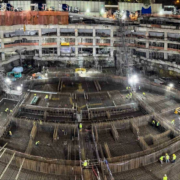Johnson Controls Launches Emiratization Engineering Programme
Johnson Controls recently unveiled its Emirati Engineering Program, a first-of-its-kind training initiative in the UAE designed to empower the next generation of Emirati engineers and technical sales professionals. Launching this summer, the programme marks a significant investment in the development of Emirati talent, supporting the UAE’s Emiratization strategy and reinforcing Johnson Controls’ commitment to fostering a skilled workforce for the future of sustainable infrastructure.
A Vision for the Future of Emirati Talent
The two-year programme offers young Emiratis the opportunity to gain hands-on experience and specialised skills across key technical domains including Installation & Service Operations and Technical Sales. By providing structured rotational programs in these areas, Johnson Controls is equipping participants with the tools, mentorship, and exposure needed to excel in engineering and smart infrastructure sectors.
“We are proud to launch this unique initiative to develop the next generation of Emirati engineering experts,” said Devrim Tekeli, vice president and general manager, MEA, Johnson Controls. “The UAE is a leader in smart buildings and sustainable infrastructure, and engineering talent is essential in driving this transformation. This program will allow participants access to world-class training and career pathways to make a lasting impact in the industry.”

A Structured Pathway to Engineering and Leadership Excellence
The Emirati Engineering Programme offers six structured rotations across the following key areas:
- Installation & Service Operations – Engineering design interpretation, equipment installation, troubleshooting, and preventive maintenance.
- Technical Sales & Customer Engagement – Product knowledge, market analysis, customer relationship management, and sales strategy.
Graduates of the programme will be skilled to assume leadership roles in engineering, project management or technical sales, supporting Johnson Controls’ mission to deliver smart, efficient, and sustainable solutions for the future.
Building Emirati Talent for a Sustainable Future
“Our Emirati Engineering Programme is more than just a career development initiative, it’s a testament to our long-term commitment to the UAE’s Emiratization Vision,” said Lama Gebara, senior HR director, MEA, Johnson Controls. “As customers increasingly seek holistic building partners with end-to-end expertise, fostering technical talent in our sector has never been more crucial. Students will have the opportunity to learn from a global leader at the forefront of solving the world’s biggest energy efficiency and sustainability challenges and become part of our 30,000 strong family of service technicians around the world.”
Applications for the Emirati Engineering Program are now open. Interested candidates can learn more and apply here.



















